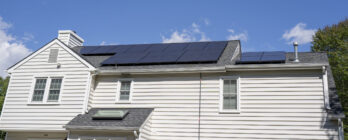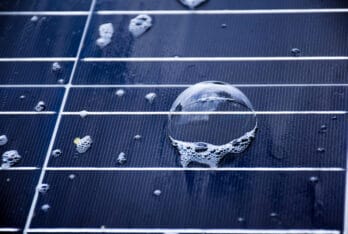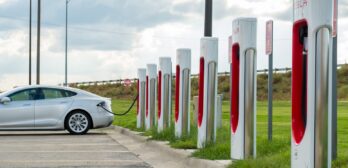Solar Panels 101: 3 Facts to Know
The solar energy industry has evolved rapidly in the past two decades. This sustainable, clean energy source has become more available for different reasons, such as panel efficiency, the high quality manufacturing processes and the sleek and modern mounting systems.
The following guide will help you find useful tools and information to find out what the best options for you and your property are, to ensure you are fully confident in your choice.
If you are new to the solar energy world, it is important to know the following concepts:
The word photovoltaic (PV) means Light Electricity. Photo comes from the Greek language and means ‘light’, volt is the word for electrical potential.
The most used PV cells today are the Crystalline Silicon Cells. They are the most used solar energy cells and were created in 1954 by Bell Labs.
The term efficiency, when speaking in a solar sense, means the sunlight that hits a solar panel and is converted into energy. Solar panel efficiency has been increasing a lot recently, and costs have decreased at the same time. One way of seeing this improved efficiency is in Gross Cost Per Watt, which is the total out-of-pocket cost of the system that you are considering and divide it by the number of watts of capacity in the system.
The cost of solar has gone down considerably over the last decade.
Key Questions You Should Be Asking
It is not easy to get a comprehensive list on prices, manufactures and solar panels because those prices are constantly adjusting (and often decreasing). However, we have created the following checklist to help you find the right solutions when talking with solar installers.
1. “How much does it cost?” and “How much can I save with solar?”
Any experienced solar installer will respond by saying, “It depends.” Make sure your installer checks to see how much power you are currently using (as well as any future energy use needs like electric vehicles), assess the space you have on your roof, and how much power can be produced accounting for things like sun angle and obstructions like shading/trees. However, what most will discover is that the cost for a fully-installed panel (which includes labor, inverter etc) is roughly between $800 -$1,400 per panel depending on what type of panel the customer selects. The price difference usually equates to better panels in terms of tiers, efficiency and life expectancy.
2. How much does it cost for the panels alone?
Panel costs vary depending on Tier. There are three Tiers, and Dominion Energy Solutions installers only work with the best, Tier 1. More often than not, you can get the same amount of power with a less-expensive Tier-2 or Tier-3 panel, but the life expectancy and manufacturing quality of these panels often lead to a shorter lifespan. Obviously, for many people, it also comes down to factors such as roof space and ‘looks’. Tier 1 panels often have an edge in terms of aesthetics, and this certainly helps in curb appeal and resale value.
The reality is that power is power once it’s created. For example, the most common panels are the 405 Wattt. Look for panels that also have warranties.
3. Should I be concerned about the look for solar panels?
We have found the answer to this question depends on the individual homeowner. The most used panels on residential homes have a black frame around them, while on commercial properties it’s a silver frame. The most used types of panels are the monocrystalline and polycrystalline. Polycrystalline panels have a navy blue color, while the monocrystalline ones have a black color. We always recommend the latter for those customers that are concerned about aesthetics as they blend better with their surroundings.
4. Apart from their color, what is the difference between a monocrystalline and polycrystalline panel?
Apart from looks, they use different technologies. Polycrystalline is a newer technology and costs less to produce, so they are usually less costly for the customer. However, they are also slightly less efficient. Monocrystalline is the older technology and more efficient but also more costly to manufacture. Monocrystalline cells tend not to break down as quickly. Most major manufacturers today build both types, and Dominion Energy Solutions installers can walk you through the options as they pertain to your own needs.
5. Should I consider a specific brand of panels?
Given the speed at which the solar panel industry is evolving, many solar panel brands are still up-and-coming. We have found that what remains most important is that the panels chosen are considered Tier 1 meaning that they are made of quality materials and constructed with solid manufacturing techniques and warranties. Country of origin is also a factor for many homeowners, and there are a number of American manufacturers to consider.
6. Beyond price, what else should I consider for a home solar system?
First things first, try and get the most for your budget. It’s really useful to have a thorough understanding of what you are signing up for in terms of panel and inverter technology. Dominion Energy Solutions will walk you through all these details, outlining the strengths and weaknesses of each option, and ensure you have full transparency into the products, installation process, and how it will meet your energy needs.
7. Should I lease, finance, or pay for my solar panels in full?
How you’re going to pay for your solar panels can be as complex as what you’re installing. You need to find the best way to pay for the panels and get the best return on investment for the future. Combined with federal and state incentives, this can help speed up the ROI considerably. Roughly, it costs between $20,000 – $40,000 to install a new residential solar system in Virginia. Obviously, not everyone has that amount ready to invest immediately. Dominion Energy Solutions offers great financing options for homeowners, and we’ll work to find the best solution for you.
8. Should I lease my solar panels?
With a lease option, the customer contracts the solar company to get a system installed. The solar company owns the system, and as the name says, the homeowner leases it through monthly payments. This helps the customer keep lower electricity costs, saving a lot every month.
While the legalization of solar leasing in Virginia might seem like a great idea, there are also some risk factors to be weary of. For example, many solar companies lack a solid track record, which raises doubts about their financial health and reliability in operations. Also, lease contracts are often structured to benefit the solar companies, with clauses allowing them to terminate the lease without cause, potentially leaving homeowners and businesses with unexpected income loss and restoration costs. Dominion Energy Solutions is happy to walk through all financing options and share what’s best for you.



